
Kurt Julian Weill was a German-born American composer active from the 1920s in his native country, and in his later years in the United States. He was a leading composer for the stage who was best known for his fruitful collaborations with Bertolt Brecht. With Brecht, he developed productions such as his best-known work, The Threepenny Opera, which included the ballad "Mack the Knife". Weill held the ideal of writing music that served a socially useful purpose, Gebrauchsmusik. He also wrote several works for the concert hall and a number of works on Jewish themes. He became a United States citizen in 1943.

Hanns Eisler was a German-Austrian composer. He is best known for composing the national anthem of East Germany, for his long artistic association with Bertolt Brecht, and for the scores he wrote for films. The Hochschule für Musik Hanns Eisler Berlin is named after him.

Frans Masereel was a Belgian painter and graphic artist who worked mainly in France. He is known especially for his woodcuts which focused on political and social issues, such as war and capitalism. He completed over 40 wordless novels in his career, and among these, his greatest is generally said to be Passionate Journey.
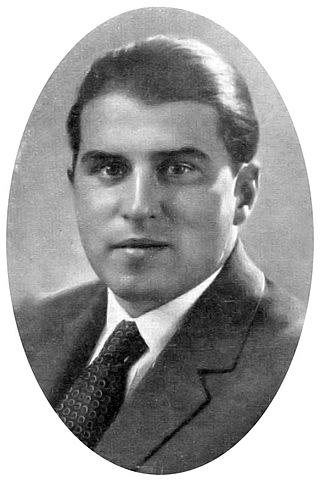
Carl Zuckmayer was a German writer and playwright. His older brother was the pedagogue, composer, conductor, and pianist Eduard Zuckmayer.

Ulrich Plenzdorf was a German author and dramatist.
The following is a list of the major publications of Johann Wolfgang von Goethe (1749–1832). 142 volumes comprise the entirety of his literary output, ranging from the poetical to the philosophical, including 50 volumes of correspondence.

Benno Besson was a Swiss Theatre Director.
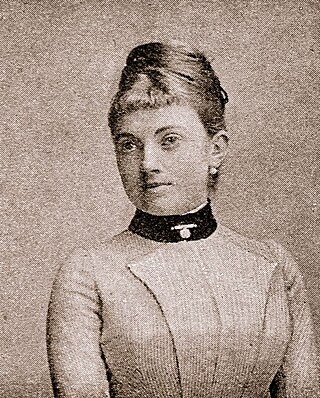
Maria Stona; Marie Scholz; born Stonawski (1859–1944) was a writer and poet born in a part of Austria-Hungary that later became Czechoslovakian. Her daughter was the sculptor Helen Zelezny-Scholz.

Rudolf Leonhard was a German author and communist activist.
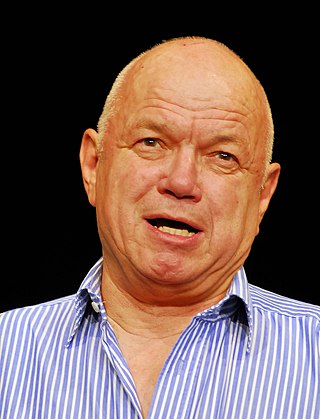
Jörg Hube was a German actor and director. He died of cancer. He was buried at the Winthir Cemetery in Munich. His estate has been cared for since 2011 at the Munich literary archive Monacensia, which also organizes an exhibition of the estate.
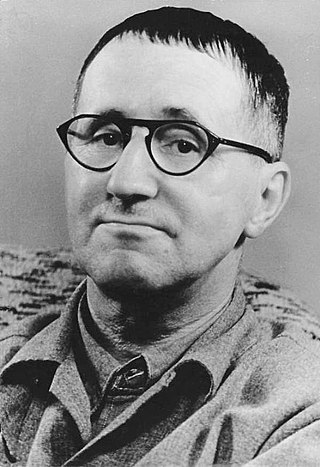
Eugen Berthold Friedrich Brecht, known professionally as Bertolt Brecht, was a German theatre practitioner, playwright, and poet. Coming of age during the Weimar Republic, he had his first successes as a playwright in Munich and moved to Berlin in 1924, where he wrote The Threepenny Opera with Kurt Weill and began a life-long collaboration with the composer Hanns Eisler. Immersed in Marxist thought during this period, he wrote didactic Lehrstücke and became a leading theoretician of epic theatre and the Verfremdungseffekt.
Hermann Karl Lenz was a German writer of poetry, stories, and novels. A major part of his work is a series of nine semi-autobiographical novels centring on his alter ego "Eugen Rapp", a cycle that is also known as the Schwäbische Chronik.

Hermann Robert Richard Eugen Kasack was a German writer. He is best known for his novel Die Stadt hinter dem Strom. Kasack was a pioneer of using the medium broadcast for literature. He published radio plays also under the pen names Hermann Wilhelm and Hermann Merten.

The Theater des Westens is one of the most famous theatres for musicals and operettas in Berlin, Germany, located at Kantstraße 10–12 in Charlottenburg. It was founded in 1895 for plays. The present house was opened in 1896 and dedicated to opera and operetta. Enrico Caruso made his debut in Berlin here, and the Ballets Russes appeared with Anna Pavlova. In the 1930s it was run as the Volkstheater Berlin. After World War II it served as the temporary opera house of Berlin, the Städtische Oper. In 1961 it became the first theatre in Germany to show musicals. Since then it has become the "German equivalent of Broadway extravaganzas", putting on plays and musical comedies.

Der Kanon or more precisely Marcel-Reich-Ranickis Kanon is a large anthology of exemplary works of German literature. Edited by the literary critic Marcel Reich-Ranicki (1920–2013), he called the anthology, announced on 18 June 2001 in the German news magazine Der Spiegel under the title "The Canon of worthwhile German Works", his magnum opus. The five parts appeared from 2002 to 2006 published by Insel Verlag: 1. Novels (2002), 2. Tales/Stories (2003), 3. Dramatic Works (2004), 4. Poetry (2005), and 5. Essays (2006). As expected, the anthology met with opposition and criticism, and even the idea of an anthology was questioned, but Reich-Ranicki called this questioning "incomprehensible, because the lack of a canon would mean relapse into barbarism. Reich-Ranicki sought to differentiate his anthology from previous compilations in his hope to imagine a "reader judge" such as teachers, students, librarians, who would need to draw from this canon because they were in the "first line of those who deal with literature professionally."

Friedrich Feher was an Austrian actor and film director. He first entered the film business in 1913, starting out as an actor but quickly gravitated toward directing.

Svendborger Gedichte is a poetry collection by the German poet and playwright Bertolt Brecht, and the last collection of new poems to be published while he lived. The collection is named after the town of Svendborg on the Danish island of Funen, where Brecht lived during his exile from Nazi Germany. During this period, Hanns Eisler stayed several times to set a large group of the poems to music in collaboration with Brecht.
Paula Banholzer was an educator and first love of Bertolt Brecht.
Walther Killy was a German literary scholar who specialised in poetry, especially that of Friedrich Hölderlin and Georg Trakl. He taught at the Free University of Berlin, the Georg-August-Universität Göttingen, as founding rector of the University of Bremen, as visiting scholar at the University of California and Harvard University, and at the University of Bern. He became known as editor of literary encyclopedias, the Killy Literaturlexikon and the Deutsche Biographische Enzyklopädie.
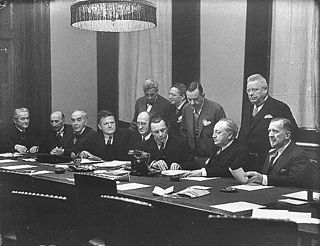
Oskar Loerke was a German poet, prose writer, literary critic and essayist. Loerke was a prominent representative of Expressionism and magic realism in Germany.
















